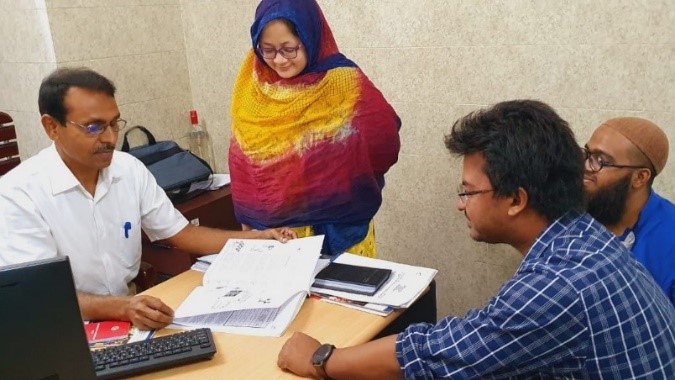MTaPS’ Recommendations Speed Up Procurement Process in Bangladesh
In Bangladesh, the Directorate General of Health Services (DGHS) is responsible for the health services of its people. As part of that job, a large focus of its work is to ensure the availability of essential medicines and other medical products through their timely procurement and distribution. USAID MTaPS has been supporting DGHS to strengthen its supply chain management through a range of interventions—developing electronic logistics management tools, building capacity, and embedding technical backstopping in different areas including the procurement process of DGHS. A set of MTaPS’ recommendations on the sidelines of its support to DGHS’ recent decentralization of the procurement activities has enabled DGHS to significantly minimize the lead time in the overall procurement process by ensuring appropriate approving authorities are assigned in alignment with the prescribed procedures.
Up until recently, almost all the procurement activities of DGHS were centrally executed by the Central Medical Storage Depot (CMSD). In the light of administrative changes in CMSD, COVID-19 pandemic and the implementation of many new projects, a big portion of procurement activity has been decentralized. Approximately 80 procuring entities (PEs) at the national level are now responsible for a big volume of procurement; however, these entities lack an adequate technically skilled workforce to undertake procurement.
To bridge the capacity gap, DGHS drew on MTaPS’ expertise for on-the-job support and capacity building to overcome the immediate transition challenges. During the course of several organized and need-based training sessions for the mid-level and senior-level officers involved in procurement, Md. Anwarul Islam, MTaPS Senior Technical Advisor, found that all PEs of DGHS sent their annual procurement plans to the Ministry of Health and Family Welfare (MOHFW) for approval, which typically takes 8-10 weeks to approve. The public procurement law of the country, however, assigns the procurement approval plan task to the director general (DG) of the DGHS. The discrepancy was brought to the attention of joint secretaries of MOHFW, directors, and line directors of DGHS during their training session. In response, the authority for approval of the annual procurement plans was shifted to DGHS from MOHFW in July 2021. Now the DG approves all the plans, which is contributing to reduced time for approval.

MTaPS has been providing the DGHS with technical assistance on procurement.
Another digression in the approval process identified was that the evaluation report of the procurement packages was being sent to the DG of DGHS for approval, which was found to take another 2-3 weeks extra time, as opposed to being approved by the officers below the rank of the DG—as per laws of public procurement and the delegation of financial power, 96% of reports are to be approved by the officers below the rank of DG, and only 4% of reports fall under the delegation of DG. DGHS accordingly aligned the approval process with the laws of public procurement and prescribed delegation of power.
As a result of the above interventions, the lead time for approval of each procurement package is reduced by up to 10-12 weeks. The changes will also minimize failures of completion of procurement packages within a fiscal year.
At the national level of health services, each PE has almost 20 procurement packages in every fiscal year—totaling 1,600 packages to complete in each fiscal year. With the decentralized authority and appropriate approval authorities in place, all national-level procurement processes can save up to 6-12 weeks, and the procurement process will accelerate in turn.
“The recent achievements in the procurement process of DGHS will bring the program one step ahead in ensuring on-time availability of required products in the program. I must thank the ADG Planning and DG of DGHS for this achievement. It would not be possible without their good intentions. I would like to extend my sincere appreciation to the USAID MTaPS program as well as Mr. Md. Anwarul Islam for his immense support in this process on behalf of USAID MTAPS program,” shared Dr. Afreena Mahmood, DGHS Director (Planning & Research).
The accelerated procurement process is facilitating the timely availability of medical products in the country while eliminating inefficiencies in the process. The gains build on MTaPS’ ongoing efforts to improve Bangladesh’s public procurement capacity as part of pharmaceutical systems strengthening that can ensure sustainable access to essential medicines and other products—core to a quality public health service system.